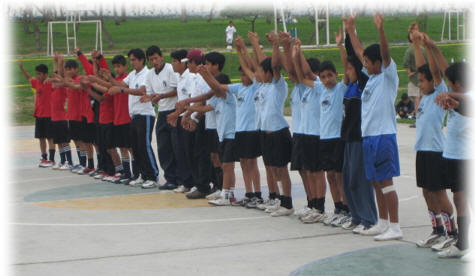
Soccer League Street Clinic Puentes

The LimaKids Soccer League: Promoting Mental Health in Victimized Children
The LimaKids Soccer Program is an intervention designed to address mental health and developmental issues facing institutionalized children in Lima, Peru. For the great majority of these children, extreme poverty has brought them either directly to the doors of the institutions, or to the institutions after having lived for a period on the streets. Of the problems that these children face, the mental health consequences of physical, sexual, and emotional abuse, neglect, drug use, and institutionalization experienced during their formative years are the most pervasive and difficult to treat. LimaKids’ founding project was conceived in 2004 to address many of these problems, with the understanding that outreach must take a creative approach in order to reach this socially marginalized group of children.
Our Intervention
The importance and benefit of sports during childhood is well documented and very relevant to the health problems that our children face. Physical activity has been shown to reduce symptoms of anxiety and depression. In addition, participation in organized sports can promote sportsmanship and teamwork, improve social skills, positively channel aggressive energy, and significantly improve overall mental health and self-esteem. In Peru, the popularity of soccer among youth makes organized soccer a captivating way to engage our population of children.
In our soccer intervention, boys and girls from institutions around Lima are organized into teams, train biweekly with skilled coaches, and participate in a series of games leading up to a championship event. The actual intervention occurs on three levels:
Ř The practices: Our coaches participate in a five week training workshop where they learn about the unique nature of our population of children and how they can use soccer as a tool to improve mental health. Coaches learn to incorporate into their practices teamwork building exercises, exercises to improve communication, leadership skills, and self esteem.
Ř The games: Teams participate regularly in games that are structured to promote sportsmanship. We have developed a unique set of rules, specifically designed for the profile of our population, to encourage fair and clean play. Teams earn points for goals, but equally important they earn points if they shake hands with their opponent, avoid aggression and foul language, have a supportive cheering section, and all team members participate in the games.
Ř The interactions: Through the intervention children encounter positive role models, something sorely lacking for the great majority. Through regular contact with coaches and coordinators of LimaKids, children receive guidance, support, and lasting friendships.
Some of the successes of this intervention include:
Participation from over 300 children in the intervention, many of whom experienced their first opportunity to develop soccer skills under the tutelage of a trained coach.
Participation from over 80 girls in organized sports for the first time.
An increase in the self esteem of children who participated in the intervention as compared with non participants from the orphanages.
An over 95% participation rate.
Reports from institution educators of a notable increase in discipline, leadership, and enthusiasm for life during the intervention period.
100% satisfaction with the project by orphanage educators, administrators, and children.
Many of the results of the intervention are immeasurable in the short-term, such as the impacts of increased contact with positive role models, providing children with an outlet from the stagnant life within the poorly funded shelters, and imparting children with a sense of self-worth. One outcome that has become evident is that some children actually remained in the orphanages, instead of returning to the streets or to abusive homes, in order to continue participating in our project.
For questions
about this website email
Joe Donroe.
Copyright 2005